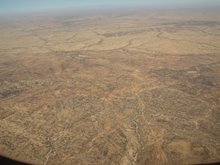The current instability in Chad, with rebel and government forces fighting across the Darfur border, should be a lesson to us all. The debate over international action in Darfur was framed in terms of moral imperative and international obligation. It could, however, been more effectively framed in terms of national interest. Darfur was not only a humanitarian crisis, although it became portrayed as one, but a devastating political crisis threatening to unravel regional order in both Sudan and Chad.
State’s are famously ambivalent about morals. Interests, however, have a more enduring force. Interests do not permit the ambiguities or delays that plagued the Security Council’s response to Darfur, nor do they permit the ineffectual, posturing that characterised Western government rhetoric. They demand immediate and effective action.
Whilst it is important to mobilise people for moral action it is also important to give politicians - institutionally inclined to protect the bottom line - a real motivation to act. A great lever for this, as has been discovered by the climate change lobby, is to tell them pay now or pay much more later.
With the war in West Darfur now part of a regional security complex and cross border rebellions in three states, the cost of re-establishing stability later is going to be significant.
Saturday, 3 February 2007
Subscribe to:
Post Comments (Atom)

No comments:
Post a Comment